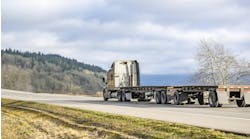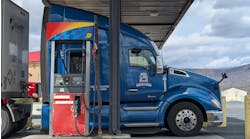Volvo Trucks North America to fuel all new trucks with HVO at New River Valley Plant
Volvo Trucks North America has announced an advancement in its sustainability efforts by fueling newly assembled trucks with hydrotreated vegetable oil at the Volvo Trucks New River Valley Assembly Operations in Dublin, Virginia. All Volvo trucks for the North American market are produced at the NRV plant, including the all-new Volvo VNL that will begin production later this summer. This initiative is part of Volvo Trucks’ strategy to decarbonize the industry through a three-pillar approach: enhancing internal combustion engine efficiency and drop-in renewable fuels to make the largest immediate emissions reductions while continuing to scale the Class 8 Volvo VNR Electric and developing hydrogen fuel cell trucks.
“Today and for the foreseeable future there will not be a one-size-fits-all approach to decarbonizing transportation,” said Peter Voorhoeve, president of Volvo Trucks North America. “That is why, at Volvo Trucks, we are focused on the three-pillar strategy with battery electric, hydrogen fuel cell, and renewable fuels in the internal combustion engine. With the all-new Volvo VNL and by utilizing HVO, we can make the most substantial and immediate impact today. There is a future for the ICE, and we’re happy to be doing all factory fills with renewable fuel, an important step towards walking the talk in our sustainability journey.”
See also: Volvo sees fleet profitability paved upon its path to zero
HVO is a renewable fuel that can be used in the same engine as fossil-based diesel without requiring engine modifications. Produced from renewable sources such as waste vegetable oils and animal fats, HVO has the same chemical structure as fossil-based diesel, so it can be used as a direct replacement to reduce greenhouse gas emissions while maintaining engine performance. By using these waste products as feedstocks, HVO production can promote a more sustainable circular economy by converting waste into valuable fuel.
Volvo Trucks is fueling new trucks leaving the NRV plant with 20 to 25 gallons of HVO per tank, with full tanks provided for trucks destined directly to customers. This initiative is expected to replace 1,125,000 gallons of fossil-based diesel annually, achieving an estimated 75% to 85% reduction in CO2 emissions for Volvo Trucks' operations in North America.
With increasing demand from shippers for sustainable transport options, HVO offers Volvo Trucks' customers a viable solution to meet these challenges today. The recent launch of the all-new Volvo VNL, featuring a 10% improvement in fuel efficiency from powertrain and aerodynamic advancements, exemplifies the potential for environmental benefits from internal combustion engine vehicles when powered by renewable fuels.
“The internal combustion engine has more than 100 years of research and development and established support in the industry. It must be part of the decarbonization journey and major, immediate decarbonization possibilities exist by using renewable fuels, including HVO and hydrogen,” said Johan Agebrand, director of product marketing at Volvo Trucks North America. “Volvo Trucks continues to work with the industry to broaden the use of renewable fuels. Fuels produced using hydrotreatment processes, such as HVO and RD100, can be interchangeable with diesel and is a viable fuel to decarbonize transportation truck operators can start using today.”



